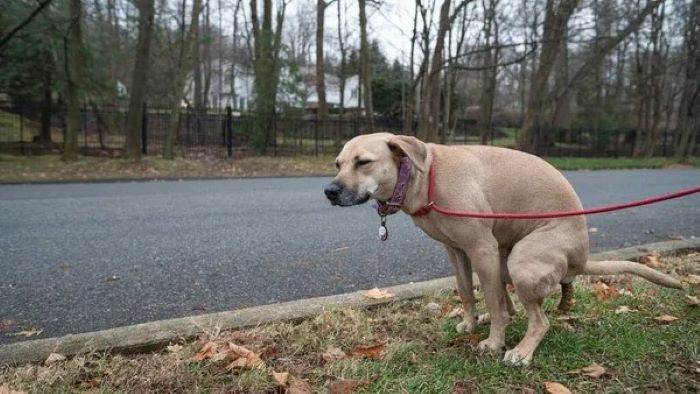Embark on a journey to understand and address constipation in dogs. Uncover the causes, symptoms, and practical solutions to ensure your canine companion’s digestive health is in optimal balance.

Key Takeaways
- Constipation in dogs can result from various factors, including diet and medical conditions.
- Recognizing symptoms and implementing dietary changes, hydration, and exercise can help alleviate constipation.
- Consult your vet for persistent or severe cases, ensuring your dog’s overall well-being.
Constipation In Dogs
Constipation can happen to every dog out there. The passing of poop becomes a major issue when the dog is suffering from this condition. The dog finds it difficult to pass the stool mainly because it gets dry and hard.
Now, some constipated dogs, try to pass the stool exerting extra pressure. The additional strain does pass the poop out but, it’s in small proportion and has blood in them.
Signs of a constipated dog
You can look for the following signs to know whether your dog is constipated or not.
- Hard and dry stool
- Lack of excretion for days
- Straining while pooping (the poop feels like pebbles once you pick them up)
- Blood and Mucus in stool
- Appetite loss
- Crying and yelping while pooping
- Continuously squatting to go to the toilet
These were the signs that suggest your furry friend is having constipation issues. In addition, when a dog has difficulty in defecating, producing small amounts of liquid faecal matter or no faeces at all is referred to as Tenesmus. Now, let’s move on to the causes.
What Causes Constipation In Dogs?
The normal digestion process for dogs is simple. Faecal matter passes through the digestive tract. The water is full of water and electrolytes and on reaching the colon, the faecal matter is passed out. Peristaltic waves trigger an automatic muscular motion to remove the faeces.
So, when this normal process slows down or doesn’t occur, the colon will keep absorbing the water. This eventually makes the stool dry, hard and compact. The poop will remain in the colon and continue losing moisture making it hard as a rock and impossible to pass at all.
The vets have mentioned that lack of exercise, poor diet and serious diseases such as cancer. In addition, the type of issue within the digestive tract suggests the cause of constipation. The Vets use terminology such as intraluminal, extraluminal and intrinsic.
- Intraluminal: refers to the blockage inside the colon
- Extraluminal: when the obstructions originate outside the colon i.e. pelvic fractures or tumours
- Intrinsic: when the block is because of nerve injuries or other diseases
Common causes for constipation in dogs:
- Age
When your dog is young their fitness and health remain good. But, with the increase in their age, you will see them facing continuous health issues. Constipation is one of them. In fact, senior dogs are more likely to have these issues in comparison to young canines.
- Diet
If your furry friend’s diet is not proper or you are frequently changing it. Regardless of your intent, you are unintentionally causing the constipation issue for your dog. Because when you don’t provide enough fibre in their diet their digestive system will get weak.
Also, feeding them bones is not a good idea. They get stuck and it gets difficult to digest. They can even splinter inside causing other issues as well.
- Less exercise
A dog needs exercise to maintain proper health. If it’s not receiving proper training or exercise, you will see its stomach get upset frequently. The reason is simple, less activity means low muscular movements and the autonomous muscle movement which helps them poop gets slow in transit. This slow transit will eventually stop and cause constipation.
- Stress
A stressed-out dog is will have constipation issues. Because when they have psychological problems they will not digest their food properly. The stress causes muscle tension and it can stop bowel movements. The stress-induced constipation is temporary but, at times it also elevates and may require medical attention.
- Eating Non-food items
Dogs have a tendency to chew and eat random stuff. They chew on wood, swallow toys, or eat their own poop. So, if these pieces are big, they can upset the stomach and the blockage caused will make pooping difficult.
- Dehydration
Lack of water often results in dry stool. This happens because the body of your furry friend will reabsorb the water from the poop itself.
- Fur
Dogs having long hair coats often risk facing obstruction issues. Often their fur covers the anal region and blocks the passage. It’s not possible for the dog to poop. Even if they do manage to discard some stool, chances are it gets stuck in the fur and this eventually leads to constipation.
Now, let’s have a peek at some additional reasons why dogs get constipation.
- Metabolic diseases such as Hypothyroidism
- Enlarged prostate or colon
- Kidney issues
- Spinal injury
- Electrolyte imbalance or dehydration
- Central nervous system disorders
What Can I Give My Dog For Constipation – Dog Constipation Home Remedy

The constipation condition is normal, but, it should not elevate. In fact, if the issue is not regular, you can use different home remedies to treat your furry friend’s constipation issue. However, even if you are using natural methods or ingredients we recommend you consult your vet before executing any such method.
- Freshwater
Generally, when your dog is suffering from constipation, the underlying cause is dehydration. The less water makes their body absorb the moisture for their faeces making the stool dry. So, give your dog plenty of water. This will keep them hydrated and help resolve the dry stool issue.
- Pumpkin puree
Using pumpkin in your dog’s diet can help reduce constipation. The fruit retains high fibre content and moisture which helps improve digestion. In fact, using 100% pumpkin puree will regulate the digestive tract and help dog poop easily.
Dogs adore the taste of pumpkin puree, so, you won’t face any issues in feeding them. However, make sure you don’t serve them a pumpkin pie filling.
- Food and Herbs
Using food items and herbs such as ginger and wheat bran, and olive oil can help improve the digestion system of dogs. These ingredients are more effective for humans but, you can also use them for your furry friend. However, it’s wise if you have a talk with the vet before using such items.
- Canned dog food
The homemade treat for dogs is fine but, you are not sure about the moisture content within. So, even if you think they are nutritious the lack of moisture may still cause stomach upset and constipation.
Now, to make the food softer and moisture-rich, you can add canned food to the normal diet. This will help regulate their digestive system and also soften their stool.
- Fibre supplements
If you are unsure about the pumpkin, you can request your vet to prescribe you some dietary fibre supplements. Using these supplements will increase the fibre in your dog’s body. Also, the poop will get soft and it will regulate the bowel movement.
- Exercise
This is one of the simplest yet most effective ways to help your dog with the constipation problem. You can take your dog for a walk and make them poop in a natural environment. Long walks can help stimulate a healthy bowel movement. In addition, activities such as running, ball fetching, and chasing can also help maintain a healthy digestive tract.
- Grooming
If your furry friend has lots of furs, make sure you groom them. Regular grooming will help minimise the risk of developing a blockage around the anus.
Now, even after using these home remedies, if the constipation problem is not resolved, consult a vet. But, how will you know whether it’s time to visit the Vet? Let’s find out.
Visit the Vet For Dog Constipation Relief

When you see your dog circling a lot, crouching continuously, dragging their bottom, across the ground, or see them crying while pooping, they are in pain and need help. In such cases, you can try using some home remedies and observe their stool. If the stool is dry, small and has water or mucus, it’s probably constipation.
Simply apply some pressure near their abdomen region and see how they react, if the pain is persistent you need to take them to the vet. Because the constipation issue is still there and needs to be resolved within 48 hours. Ignoring this can have some serious repercussions – your dog will start vomiting, and minor constipation can turn into diarrhoea.
When you visit the vet, it’s crucial to give them complete information regarding your dog’s condition:
- Approximate time of the last bowel movement, also the details regarding the previous normal bowel movement
- Provide the details of their diet, food habits, and medications
- Mention the stool colour and specify any variation
- Tell the vet about any non-food item that your dog may have ingested
- Inform the vet regarding any injuries they recently suffered
- Highlight signs of pain, distress, vomiting, bloating, or vomiting
A vet will use this information and proceed with the necessary treatment. Also, before you take your dog to the vet, it’s crucial you collect some stool samples. This can help the vet determine the cause of constipation. Fresher the stool the better.
Dog Constipation Treatment by a Vet
A vet will start with a physical examination of your dog. This will help them recognise any anomalies such as distended colon, tumour or foreign objects. At times, they may also conduct blood tests, Urinalysis, x-rays, and ultrasounds of the abdominal areas to underline the exact cause of the constipation issue.
Now, if the diagnostic suggests a minor constipation condition, instead of any medical treatment, the vet will simply recommend you alter the diet of your furry friend. Also, while doing so, they will emphasise giving them excessive fresh water.
Further, if the vet thinks it’s chronic constipation, you can expect them to proceed with a clinical method. These methods shall involve the following aspects:
- Use of laxatives – after the diagnosis, the vet will suggest laxative suppositories, pills, or liquids that you can use for your furry friend. You may see them prescribing Lactulose, DSS, Cisapride, or Bisacodyl.
- Drug – vet may use drugs that help to trigger a regular colon function or restrict the production of some enzymes.
- Enemas – the procedure involves injecting a large amount of soapy water to break down the dry stool. A vet will sedate your furry friend before initiating this procedure as it is painful. Not all dogs can handle having an enema so, a vet will only use it if they feel your furry friend can tolerate it. In addition, enema solutions are toxic for dogs and can worsen their health if not used properly. So, never make an attempt at home.
- Surgery – in severe cases of dog constipation, the vet may have to perform surgery. Such extreme condition is known as megacolon. This condition suggests that your dog’s colon is dilated and weak.
These were some of the basic treatments you will see your vet use. Some additional methods involve manually removing the faeces if the colon is impacted, enzyme-blocking or, nerve-stimulating medicines.
So, after treatment, it becomes crucial you take proper care of your canine friend. The vet will give you some tips on how you can manage your dog’s health with a proper diet.
FAQs
What can I give my constipated dog UK?
You can try giving your constipated dog the following things: more fibre in their diet, give them laxatives i.e. stool softener, or vet-prescribed medications to help your dog overcome constipation.
Is constipation in puppies normal?
No, it’s not. Constipation normally happens to adult or old age dogs. But, if your puppy is constipated, it may have swallowed a non-eating food item, toy or some other big item. These can cause obstruct the digestive tract and make it hard for them to poop.
Is milk a good dog laxative?
Many claim that milk is a good home remedy for dealing with constipation for dogs. But, they are lactose intolerant. So, using milk as a dog laxative can also cause issues such as diarrhoea. Hence, it’s not a recommended solution as it can elevate the health problem for the dogs.
How long does it take for a dog stool softener to work?
In general, it takes a couple of days for stool softeners to show the effects. They wet and soften the dog’s poop which makes it easy for them to discard. However, vets suggest not giving the stool softener on a regular basis.
What can I do when my dog can’t poo and keeps crying?
When your dog can’t poop, they are probably straining hard to pass their stool. This can get painful and you may see them carrying while trying to poop. This happens when they have eaten something that is not easy to digest or obstructs their GI tract.
Authors Remark
A dog suffering from constipation must get proper attention and care from their owners. Neglecting the issue can elevate their condition and disturb their health. So, to avoid such extreme situations, use different methods and take precautions to manage a healthy digestive system for the dog.
You can start with natural remedies and home treatments. These methods are useful in dealing with minor constipation issues in dogs. However, if the condition is serious, i.e. a dog is suffering from megacolon, consult a vet and if necessary get their treatment started.
Lastly, if your dog has already faced the constipation issue, use the advice your vet gave you and maintain a low-residual diet, use supplements and also use the medicines as suggested.



